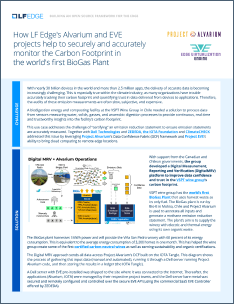
Project Alvarium, with initial code seeded by Dell Technologies, is aimed at building a framework and SDK for trust fabrics that deliver data from devices to applications with measurable confidence. Trust fabrics take a system-level approach by layering trust insertion technologies spanning silicon to cloud and will usher in an entire new era of business models and customer experiences driven by interconnected ecosystems. Initial contributing companies include Dell, the IOTA Foundation, Intel, Arm, VMware and ZEDEDA.
Differentiated in its comprehensive view and in delivering data to applications with measurable confidence, Alvarium is unifying, not reinventing trust insertion technologies and is relevant to all markets and solution stacks.
Alvarium’s mission is to create a framework and open APIs that bind together existing open source and commercial value-add for trust insertion, and develop confidence score algorithms. As well as collaborate with other LF projects and industry efforts (OSS, SDO) to unify existing and emerging trust insertion technologies and refine scoring algorithms.
What is a Data Confidence Fabric (DCF), or “trust fabric”?
- A Data Confidence Fabric (DCF), or more generally-speaking trust fabric, is a virtual overlay that aids in the delivery of data from devices to applications with measurable trust characteristics.
- A DCF is a loosely-coupled collection of various trust insertion technologies, bound together with an open framework
- Example technologies include tools for silicon-based Root of Trust (RoT), open authentication and data ingestion APIs, metadata handling, immutable storage and blockchain/ledger
- The Alvarium framework features open APIs and integrated algorithms to generate confidence scores for data based on the trust insertion technologies used and overall context
- There is no single DCF, rather each entity/organization can build their own fabric with preferred technologies using the Alvarium framework
- A trust fabric built with widely trusted ingredients will naturally produce the highest data confidence scores
- Confidence scores normalize across systems of systems as data flows through intersecting trust fabrics
- Key differentiation from other efforts focused on security, privacy and trust:
- Holistic, system-level focus
- Confidence scores to enable organizations to act with measured risk based on policy appropriate for the use case / context, working across heterogenous systems of systems
Why do we need to collaborate on a global trust fabric?
- Pervasive sharing and monetization of data, resources and services across heterogenous systems of systems spanning public and private boundaries
- Can also include trusted sharing/exchange of data sets for training AI model
- The common “zero trust” model isn’t scalable, access policy needs to be attached to trustworthy data
- Consolidating workloads on common infrastructure in a trusted fashion
- Enable sharing of data/services based on policy while protecting privacy and IP
- Address common debates on data ownership
- Meeting compliance requirements (e.g. GDPR) at scale
- Enables organizations to trigger deletion of distributed data in place when a user requests to revokes privacy consent
Learn more about how trust fabrics will help scale data sharing and monetization while protecting privacy:
Get Started With Alvarium
